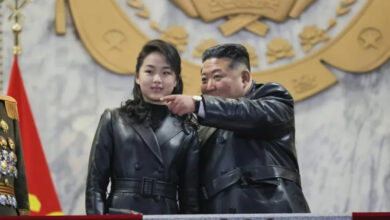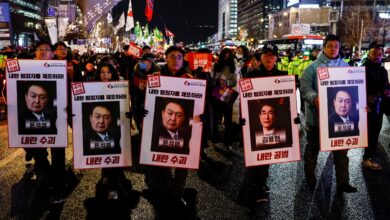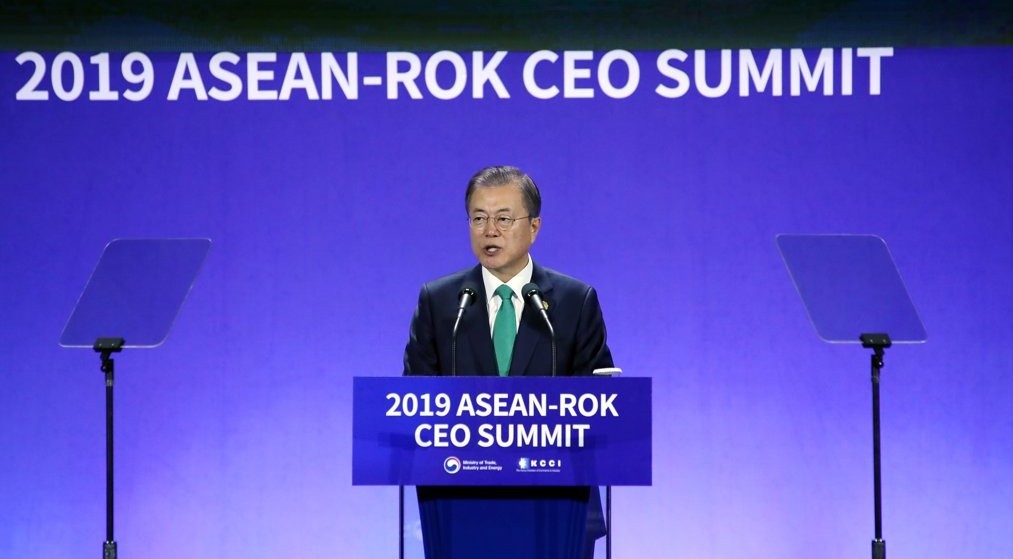
South Korean President Moon Jae-in on Tuesday opened the ASEAN summit, aimed at improving economic cooperation which has risen nearly 30-fold in the past 30 years since the founding of the 10-member Association of Southeast Asian Nations (ASEAN).
South Korea’s Vice Minister for Land, Infrastructure and Transport Park Sun-ho said that cooperation between his country and Egypt has been in full swing in various fields.
He pointed out that the newly launched subway project in Egypt is the biggest example of the depth of cooperation between the two countries in transport and communications, adding that in the future there will be cooperation in the infrastructure field.
Moon also opened the Korea Summit with countries along the Mekong River at the Busan Exhibition and Convention Center, southeast of Seoul, amid tight security.
Topics related to biodiversity, Information and Communications Technology and smart cities were discussed, alongside the issue of demilitarizing the Korean peninsula from nuclear weapons.
Moon said that his country is leading the process of nuclear disarmament and lasting peace on the Korean Peninsula by turning the DMZ into an international peace zone.
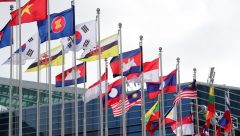
He said that peace on the Korean Peninsula is peace in East Asia, and stressed that if the third North Korea-Washington summit is held, East Asia may become one community at last.
Before the summit, South Korean President Moon invited his North Korean counterpart Kim Jong-Un to attend the ASEAN summit but was rejected, prompting the Presidential office in South Korea to express their regret as the North Korean leader wasted an opportunity to meet with leaders of the ten countries, as well as the Southern President.
The South was eager to invite the North to emphasize efforts being made in establishing peace across the Korean Peninsula, in light of the stalemate of relations between North Korea and the US.
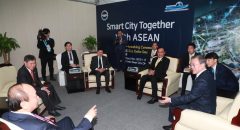
The South Korean President held a bilateral summit with the sultan of Brunei, Hassanal Bolkiah, in order to develop the energy and technology industries given the latter’s natural resources.
Both sides agreed to establish a smart city in Brunei.
The signing of an agreement on the manufacture of medicines with Singapore was also announced, after the market value of medicines for ASEAN countries reached US$26 billion last year.
Cambodian Prime Minister Hun Sen was absent after his mother-in-law was taken to hospital. His country was represented instead Deputy Prime Minister and Foreign Minister Prak Sokhonn.
More than 500 businessmen participated in the summit to exchange ideas on ways of cooperation, and it was agreed to establish a ministerial council between South Korea and ASEAN countries in the smart cities field, as part of Korea’s plans to establish a system of cooperation with member countries, the Middle East and Central and South America.
It also announced its intention to establish a US$1.3 billion Global Factory and Smart City Fund.
The Indonesian President Joko Widodo, Prime Minister of Thailand Prayut Chan-o-cha and Prime Minister of Vietnam Nguyen Xuan Phuc, focused on joint cooperation especially in the near future for the peoples of the ASEAN, representing a population of about 650 million people, with hopes that these countries will represent the highest bloc of economic growth in the world.
The Ministry of Commerce and Industry of South Korea said that the volume of trade with ASEAN countries is up almost 20 times over the past 30 years, noting that the volume of Korean exports reached $80 billion in the past 10 months, and that in 1989 the volume of exports was $3.9 billion annually.
On the sidelines of the ASEAN summit, the ministry stressed that the regional free trade agreement, which called for a “comprehensive partnership” between the ASEAN countries with China, Japan, New Zealand and Australia, will contribute to increasing the volume of investment.

